Hello, fellow RV enthusiasts! Let’s explore a common winter concern – the reliability of our propane tanks. Having navigated many cold seasons in my RV, I’ve gathered some valuable insights about propane that I’m eager to share with you.
So, we’re going to look into the question of whether propane tanks can freeze in winter and how best to avoid it from happening.
Propane in a Nutshell
Alright, let’s set the scene. Imagine a winter superhero, invisible yet powerful, keeping our RVs cozy during the frosty months — that’s propane for you! It’s not just a fuel; it’s a fascinating tale of science and nature.
So, let’s dive into the world of propane, uncovering its origins. Have you ever wondered how this unseen hero keeps us warm and toasts our marshmallows to perfection? Let’s find out!
Natural gas is a colorless and odorless gas found deep underground, often near where crude oil is located. Both natural gas and crude oil come from plants and animals that died millions of years ago and got buried under sand and rock. Over a very long time, these remains changed into natural gas (which is a gas) and crude oil (which is a liquid).
We extract and later process natural gas and crude oil, a procedure that separates out propane, diesel, and gasoline — forms of stored energy, as byproducts. These fuels meet our needs for activities like heating homes, cooking our food, and running RVs.
So, to succinctly summarize, propane is a byproduct of the processing of natural gas and crude oil. Isn’t that cool to know?
Now, the Important Question: Can Propane Actually Freeze?
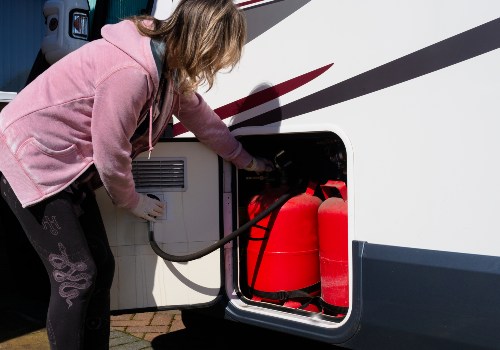
So imagine you’ve just wrapped up an awesome day of snowboarding or ice fishing, and what’s waiting for you? A cozy, warm RV, all thanks to propane. But hold up, it’s not just about keeping our toes warm. Propane is our secret weapon for whipping up a hot meal or getting that coffee brewing on the RV stove.
So, now the highly anticipated question — can propane tanks actually freeze over?
Propane, the fuel we use in tanks for heating or cooking, is actually a gas at room temperature and normal atmospheric pressure.
However, when we store it in tanks, the propane is under pressure, which increases its boiling point, allowing it to remain in a liquid state even at higher temperatures, such as room temperature.
When the propane is released from the tank, and the pressure decreases, it quickly vaporizes and becomes a gas. This makes it easier to store and transport.
Now, regarding freezing — propane does turn into a solid, but it requires extremely low temperatures to do so, around -306.4ºF (-188ºC), which is much colder than any temperature we’d normally experience on Earth.
So the answer is it’s highly unlikely that propane will ever freeze barring something truly catastrophic happening to our planet. That’s not to say, however, that cold weather doesn’t affect the efficiency of propane. Read further to understand why.
Staying Toasty: Propane Tips for Cold Weather
Now, the real issue isn’t about propane tanks turning into ice blocks. It’s more about how cold weather affects propane’s kick.
A BTU, or British Thermal Unit, is a measure of heat. It’s like a yardstick, but for measuring how much heat something gives off. Think of it as a way to understand how much warmth you get from different fuels like propane. One BTU is the amount of heat needed to warm up one pound of water by one degree Fahrenheit. It’s a common way to talk about energy in things like heaters and grills.
Now, when it’s cold outside, it can affect how well propane works. Propane is usually kept as a liquid in tanks and turns into gas when you use it. In cold weather, the pressure inside the propane tank drops, making it harder for the propane to turn into gas. This doesn’t mean there’s less heat in the propane, but it can make the propane less efficient in delivering that heat to your appliances. In very cold conditions, this can lead to problems with heating or cooking because the propane might not vaporize properly.
But no need to worry about cold weather affecting your propane tanks – we’ve got some practical solutions below.
Want to Connect With a Community of Over 1,078 RV Enthusiasts?
1. Insulating your propane tanks is the way to go. Wrapping them in an insulating throw, like a fleece or wool blanket, can make a big difference. These throws are great because they’re lightweight yet effective at trapping heat, which helps keep the propane in a more fluid and efficient state. It’s akin to wearing a warm sweater on a chilly day – it keeps the cold at bay and the warmth close.
2. Securing the throw is just as important as choosing the right one. A sturdy bungee cord is your best friend in this scenario. It ensures that the throw stays wrapped tightly around the tank, preventing it from unwinding or slipping off, especially when you’re driving. This constant insulation is key to maintaining the propane’s effectiveness, even in freezing temperatures.
3. For an even more robust solution, consider propane tank heaters. These specialized devices are designed to maintain optimal temperatures for your propane tanks, providing a steady, reliable source of heat. They’re a fantastic option, especially in harsher winter conditions, ensuring that your propane remains fluid and ready for use.
- Multi-directional radiant propane heater mounts directly to a 20 lb tank for easy portability
- High-medium-low regulator: 45,000-36,000-30,000 BTUs
- Tip-over safety shut-off switch
- Approximate 9.5 hour run time on high with a 20 lb tank
- Mounts on 20 – 100 lb propane cylinder
In essence, keeping your propane tanks warm during the colder months can be as simple as wrapping them in a throw and securing them with a bungee cord or as sophisticated as using a dedicated propane tank heater. Either way, these methods help ensure your propane stays efficient, letting you enjoy your winter RV adventures without worry.
Fixing a Frozen Propane Tank (Video)
Wrapping Up: Propane, the Winter RV Hero
And that’s the lowdown on propane and cold weather. It’s not about propane turning into a frozen block; it’s more about helping our furnace deliver that cozy warmth we all love.
So, next time you’re braving the winter in your RV, remember these tips. Keeping your propane tank warm can make a huge difference. It’s an easy, wallet-friendly solution for a warm and comfy RV experience.
And let’s not forget – propane does so much more than just heating. It’s our go-to for cooking, making hot drinks, and keeping our food cold in the fridge.
Related: Check out our article on how to prepare your RV for cold weather living.
So here’s to propane – our trusty companion in the RV world, especially during those chilly adventures. Keep warm, folks, and happy cold weather RVing!
"Man cannot discover new oceans unless he has the courage to lose sight of the shore."
-- Andre Gide

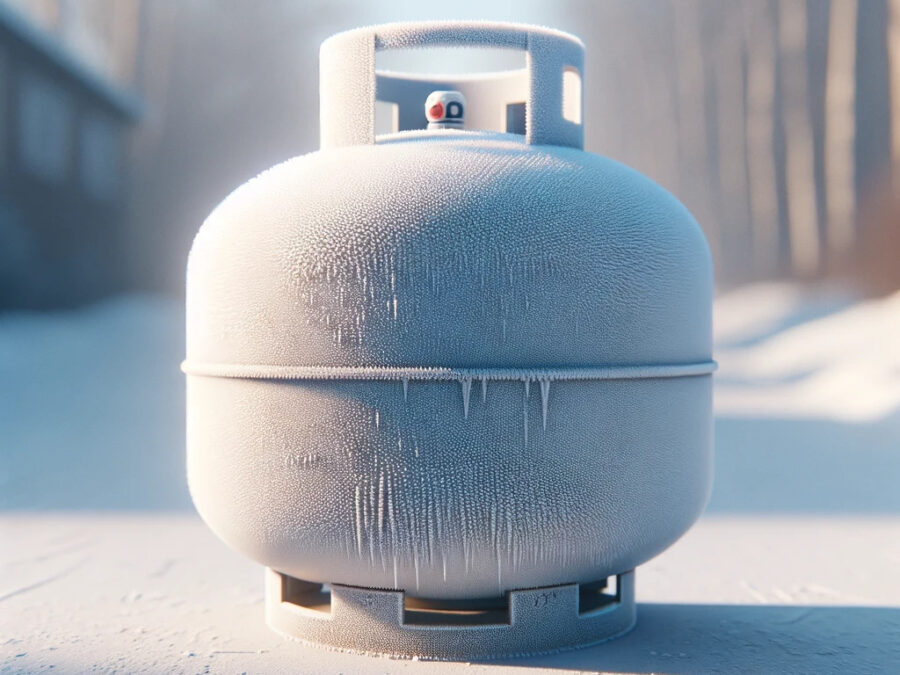

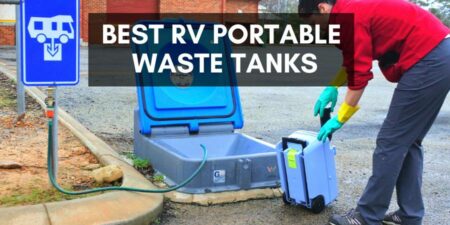

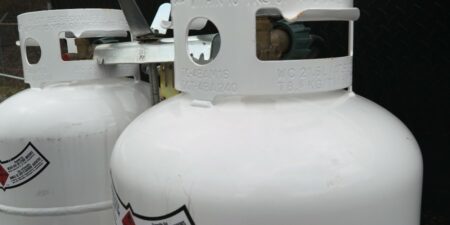
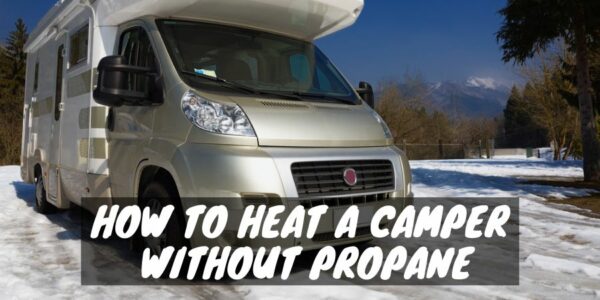






It’s not about propane freezing solid – as the propane liquid boils off to gas in the tank it gives up heat and cools. So to me insulating the tank could have the opposite effect – allowing the propane liquid to get cold enough that there is not enough boiling off to a gas to keep up with the need. I have experienced this trying to warm a tempory shelter in the winter with a fair sized space heater and 100 pound propane tanks.